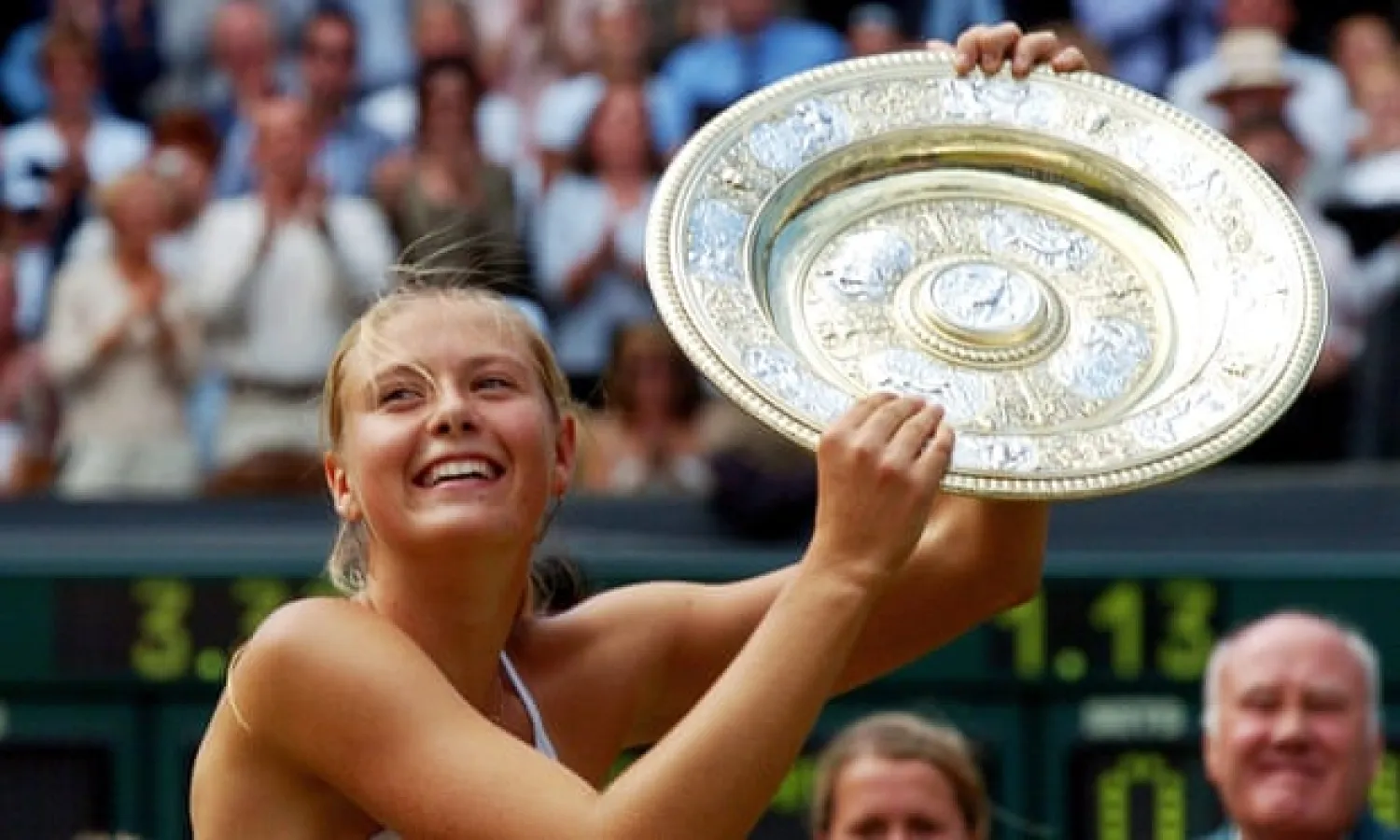The first time Maria Sharapova arrived at the top level of professional tennis she was introduced to the world as a “babe”. Sharapova had been drawn to face Ashley Harkleroad, another blonde youngster thrust into the spotlight on the perceived strength of her looks, in the first round of Wimbledon in 2003. The tabloids exploded.
Sharapova was only 16 years old but the match was dubbed “the battle of the babes” and she later sat through a cringe-inducing press conference as journalists leered at a child and then put their leering thoughts to her. “How are you going to fill the [Anna] Kournikova role?” asked one reporter. “What’s the biggest difficulty with certain looks and a certain ability to keep concentrated on the sport?”
Last Wednesday Sharapova announced her retirement from professional tennis after a tough struggle with age and a crumbling shoulder. With five grand slam titles, a career grand slam and 36 titles overall, her career has been a 16-year response to the latter question. The platform chosen for her announcement, a first-person article published in both Vogue and Vanity Fair, seemed to be a reflection of how she wants to be remembered – a rare athlete whose celebrity transcended the sport she played.
It has been that way for a long time. Even when she was still winning grand slam titles her career seemed to be better defined by the annual announcement of her topping the Forbes rich list. No tennis player in history has been likened to a brand as much as Sharapova, phrasing that has even permeated the minds of her fellow players. “Her impact on the sport, not just women’s tennis but men’s tennis, tennis in general, was great,” said Novak Djokovic, the men’s No 1. “It still is great. It’s going to keep on being present because her brand, I think, exceeds her tennis achievements.”
The fascination with Sharapova’s money has always been curious because, as her first Wimbledon experiences showed, so much of it is a simple reflection of a society that values and promotes a certain look. As she has grown into herself the Russian has assumed agency for her brand and harnessed it into new ventures that will keep her busy for long after her career; but she also had opportunities that many other players didn’t.
The duality of Sharapova’s image is that while she presents her manicured image away from the courts, what she has brought to the sport is so specific. She burst on to the tour playing vicious, precise tennis and winning the 2004 Wimbledon, 2006 US Open and 2008 Australian Open titles by the time she was 21. Although her shock win against Serena Williams in the Wimbledon final was always hoisted up as her signature victory, even more impressive was the consistency she quickly established as a teenager and how she twice dismantled Justine Henin en route to subsequent titles.
Sharapova hit the ball hard and flat and instinctively knew how to construct an aggressive point, but her game was already limited before she returned to the tour in 2009 after shoulder surgery and with her serve diminished. It is difficult to think of many players who would have continued to thrive after a weapon as essential as her serve was affected.
No longer able to consistently strike the ball as cleanly, Sharapova simply leaned heavily on her love of a brawl and her street-fighting instincts, battling back to the No 1 ranking after winning the French Open in 2012.
Glimpses of the real Sharapova are visible in the long looks down the court, the clenched fist tapping against her thigh, in the way her refusal to make friends enraged. In the midst of an epic three-set match against Agnieszka Radwanska she buried a forehand and bellowed “run, run” across the court. After the French Open crowd booed her in 2008 for no reason she crunched a forehand winner, pivoted on one foot and bellowed “Allez up your fucking ass”. What she brought to the table inspired devotion and loathing, but she made most people feel something.
Even as her head-to-head with Serena Williams descended to 2-20 the Russian was a rare player whose presence heightened a moment, who made the most important matches feel even more essential and tense.
Sharapova was always a divisive figure but her doping ban cast a shadow over her career. The case itself falls into the grey moral areas of sport – she was legally taking meldonium for 10 years when it was added to the banned list in 2016 and she immediately committed a doping violation with her first test at the 2016 Australian Open.
At the tribunal her agent’s explanation of how they failed to note meldonium’s status change deserved a laugh track. Max Eisenbud explained he usually checked the list while on his annual holiday during the off-season but, because of his divorce, he had forgone that holiday and so he forgot to check. After she attempted to control the damage by announcing the ban herself and demonstrating contrition, she never conceded she had used it legally to help her performance. In the end, although more than 170 athletes were banned for meldonium, Sharapova was one of the few to receive significant punishment for it.
The slapstick errors that led to her ban seemed to be a significant revelation. After a decade of narratives about the weight of her brand and the machine behind it, it revealed her as just someone who can be sloppy and make bad judgments. Rather than for the money she made and the brand she built, perhaps it is better to remember her as a flawed person, like everyone else, who achieved enough.
The Guardian Sport









